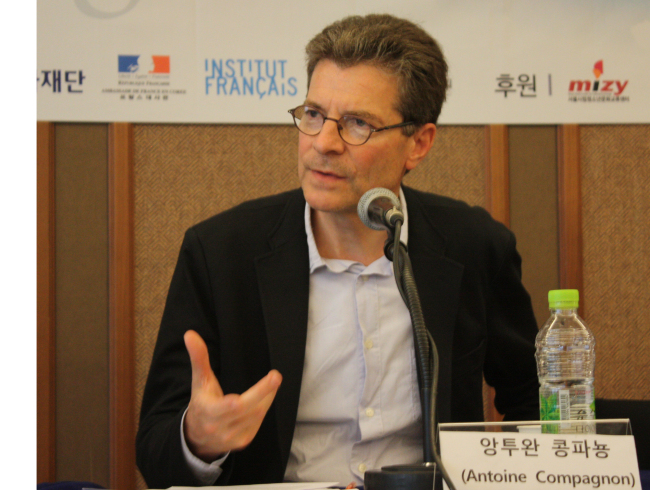French scholar Antoine Compagnon used to think the plane was the perfect place to read. But he recently discovered it may no longer be.
“There used to be nothing else to do other than read (hard-copy books) on the plane,” the scholar said during a press conference in Seoul on Friday. “But now people watch movies and play games using their tablet devices. And I hear in-flight Wi-Fi is now available for New York-L.A. routes.”
While he appreciates e-books and the technology, Compagnon, who specializes in French literature, said he is concerned about younger generations who do not have the chance to read hard-copy books without constantly having to worry about their Facebook messages and online games on their tablet gadgets and smartphones.
 |
French scholar Antoine Compagnon speaks during a press conference in Seoul on June 7. (Yonhap News) |
“I think the sense of foreignness is important in every reading experience,” the scholar said.
“When you are about to read a new book, and start reading its first page, you are not sure what to expect. And as you read more pages, you gradually familiarize yourself with the foreign world that the book is presenting. And that process requires being alone and concentration. I don’t know if one would get that sense of foreignness and familiarization with e-books, as well as smart gadgets that require constant multitasking.”
Born in 1950, Compagnon grew up reading books, spending many hours at the National Library of France studying texts by Marcel Proust. He would find Proust’s original handwriting, and read them over and over under the library lights.
His life as a scholar specializing in literature went through a dramatic change as technology developed and the Internet became an indispensable part of modern society. Instead of hitting the library, he now accesses the texts online at home.
“You can even read them better at home,” he said, noting his generation can only benefit from the advanced technology. “You can even zoom into the text you if you want to.”
The scholar said he is witnessing that change in the lives of younger generations every day. He recently visited a middle school to give a lecture, and was surprised to find out the young men and women did not know how to use a hard-copy dictionary.
“They were so used to using online dictionaries,” he said. “So they didn’t know they had to follow the alphabetical order when using a hard-copy dictionary. They learned the alphabet in kindergarten, but forgot the alphabetical order as they rarely had to use it as they grew older. I think the advancement of our technology is changing the things that we remember and don’t remember, and that we really need to think about these things.”
Compagnon, who currently teaches at Columbia University in New York City and College de France, was taught by some of the most celebrated French scholars of the 20th century including Roland Barthes, Michel Foucault and Gilles Deleuze.
“France welcomed such great scholars all at once in the ’60s and ’70s,” he said. “I think this was because, as Sartre said, (academia) in France was lagging behind in the ’40s and ’50s. I think falling behind is sometimes necessary for extraordinary developments. So I think it’d be better if we don’t rush too much.”
By Claire Lee (
dyc@heraldcorp.com)








